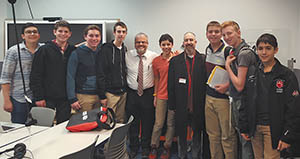


It’s playoff time in Cougar Nation at Yeshivat Frisch, with teams competing for titles in volleyball, hockey and basketball. In addition to the many fans joining us in person at the games, fans can now watch our games via live stream.
While researching and planning the implementation of this project with various stakeholders, I knew that it would provide a valuable service for our community—but I failed to realize the enormous learning opportunity it would be for our students as well. The Cougar Nation Livestreaming Crew, as my students named themselves, has benefitted from real-world project-based learning.
Let me explain.
Project Based Learning (PBL) is defined by the Buck Institute for Education as a teaching method in which students gain knowledge and skills by working for an extended period of time to investigate and respond to an engaging and complex question, problem or challenge. Key elements of PBL include challenging problems, extended inquiry, student voice and choice, reflection, critique and revision, and, most importantly, an authentic product presented to a real-world audience. The authentic product presented to a real-world audience is what distinguishes project-based learning from other teaching strategies but it is often the most difficult aspect of PBL to implement.
Creating an authentic product for a real-world audience is unique because the student is not producing something to please his or her teacher but to impress his or her peers. It creates not only an external motivator—the need to produce for an audience—but is also internally motivating, because students want to put their best foot forward and are driven to succeed on something they know is important to others.
These types of assignments are difficult to administer on a consistent basis in the regular classroom setting. Some subjects can feature a special night for students to show off their work (the Evening of the Arts, the Science and Engineering Symposium at Frisch and, of course, Shiriyah come to mind). But consistently implementing this across every subject area multiple times can become artificial. That’s why when one finds genuine PBL that can be carried out on a consistent basis, it’s quite exciting.
So what does this have to do with livestreaming? I discovered these past few weeks that having a student-driven livestreaming crew is real-world project-based learning at its best. The excitement connected to our Cougar Nation live-streaming launch has been infectious. This has been complemented by students gaining various 21st-century skills without even realizing it.
Students created signs with QR codes connected to online forms, which they plastered by the hundreds throughout the school. They utilized various digital tools to share and explore ideas. This all happened organically, led by students trying to solve the need to communicate and collaborate. It was not assigned by me; I functioned merely as a facilitator and guide. I am in awe of my students’ enthusiasm, creativity and hard work.
The online forums have ignited many learning opportunities, such as discussing various issues of equity connected to this process—students have been pondering how to fairly divvy up the work, deciding who broadcasts which games and who assigns the various roles of camera person, computer tech and announcer.
Students quickly realized the platform not only allowed for live broadcasting but for predesigned video and graphic segments to be mixed into the production as well. This has led students to start devoting their free periods to creating intros and highlight videos for the various games. They even scripted promos for future games and a commercial for “Clem’s famous pizza” from our cafeteria.
After watching and reflecting on their games, my students recognized the need to further improve their announcing skills and used Twitter to message broadcasters to seek out their expert guidance. As a result of these fruitful interactions, just this past Tuesday our students were able to hear from an experienced producer, Michael Roth, who has worked for ESPN and FOX Sports.
Michael watched two game films prior to coming so he was able to give specific feedback on what the crew needed to do in order to produce a professional broadcast. Students took and shared copious notes and immediately went to work defining clear roles for the broadcast, typing scripts of different stats and anecdotes about the players for announcers to share during the game, and adding orange tape to the camera viewfinder to delineate where the scoreboard would be in the broadcast. They even raised funds to purchase wireless headsets so the statisticians and producers could provide real-time feedback and information for the announcers and camera people just like Michael described in his studio.
Students created new social media platforms to post highlights from games on Twitter, Facebook and Instagram. They recently moved the Cougar Nation Livestream to a YouTube channel, allowing for an even wider worldwide audience. One student has even designed a beta version of a Cougar Nation Livestreaming app and website.
What has made this such a powerful project-based learning experience is the authentic product, the sports broadcast, which students are producing on an almost nightly basis to a real public audience during these busy playoff weeks. The students know that what they create will be transmitted to an audience of hundreds, and perhaps even thousands, of devoted fans. They want their production to be the highest quality possible and are innately motivated to do their best work, and then reflect and revise to enhance their product.
I’m excited for what awaits us in the rest of the playoffs. I hope our teams exercise good sportsmanship and, of course, I want them to win. At the same time, I am excited for the continued intellectual growth by our Cougar Nation Livestreaming Crew as they further their quest to create the highest-quality broadcast for our fans everywhere.
By Rabbi Tzvi Pittinsky, Director of Educational Technology, The Frisch School










